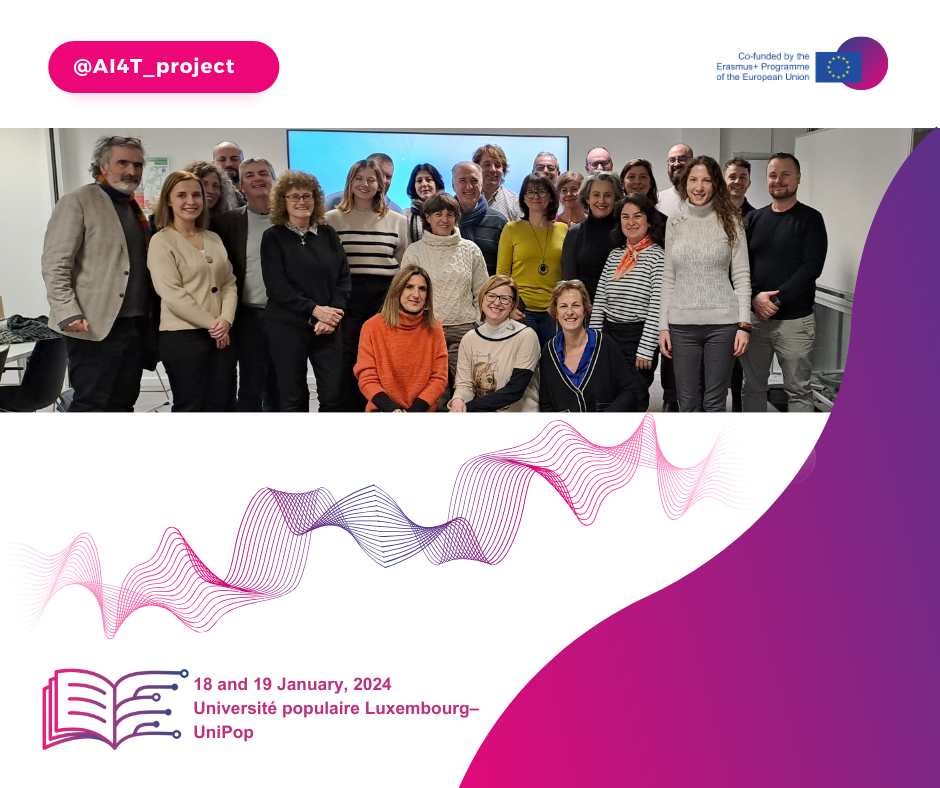[Esch-Belval, 18 janvier, 2024] Media Press Release
AI4T is a three-year Erasmus+ project developed by partners from five European countries (France, Ireland, Italy, Luxembourg, and Slovenia) that focuses on supporting secondary school teachers in the use of AI in the classroom. This project focused on teachers of mathematics, science and modern English language, who were teaching students aged 15 and 17. The project involved 17 partners representing ministries of education, universities, research centres and private companies. The main aim of the project was to create a professional learning pathway for teachers to help them understand the potential and risks of using AI in their classrooms.
Between November 2022 and June 2023, a total of 1,005 educators from 302 schools across the five countries participated in the AI4T professional learning pathway, which included online live sessions, face-to-face meetings, webinars, AI4T MOOC and an open textbook. The project evaluated the AI4T MOOC and captured feedback from738 teachers, 204 school leaders and 7551 students via online questionnaires, while 88 teachers and 18 school leaders were also interviewed. The creation and sharing of the professional learning pathways with teachers was most opportune, as they were made available to participating schools just as the world was discovering the potential of ChatGPT in November 2022.
The final conference of the AI4T Project is held in Luxembourg, at the Université Populaire Luxembourg on January 18th and 19th 2024, where the project team will share their experiences and lessons learnt. More than 200 participants from over 20 countries will be attending the event, either in-person or live online. The final conference will bring together the project team, leaders from the world of AI, policy makers, researchers, and teachers, to share their experiences and deliberate the findings over two days. The event will be launched by Alain Thillay, Policy Officer at the DG-EAC-C4 Digital Education Unit of the European Commission, who will present the European Commission’s perspective on AI and its potential impact on teacher empowerment, while also considering the implications for member states in addressing these challenges. In addition, Romina Cachia, a senior researcher and Team Lead at the European Commission’s Joint Research Centre, will present her findings from the JRC report on The Futures of Technology in Education: Emerging Trends and Policy Implications, where she will focus on the relationship between technology and teaching methods, providing valuable insights into future educational landscapes. The conference has organised a number of panel discussions which will feature a number of internationally recognised experts in the field, who represent universities and research centres connected to UNESCO and OECD, as well as teachers who have participated in the training. These events will provide the panel and the conference attendees with an opportunity to deliberate on the current issues surrounding AI in education. In addition, attendees will have opportunities to participate in a range of workshops focused on issues relevant to policy makers, researchers, teachers, school leaders, teacher trainers and inspectors, ensuring that there is something for everyone who attends.
The AI4T project has produced seven key policy recommendations that have emerged from the project findings, and which can assist in shaping the future of AI integration in education. The recommendations advocate equipping teachers with basic AI resources, strongly recommend the development of a comprehensive professional learning pathways tailored to the national context and increased transnational cooperation for EU sovereignty in AI discussions. These recommendations emphasise ethical considerations, clear guidance from authorities and targeted training for inspectors and teacher trainers. They stress the need for institutional support and assessment of student outcomes to address concerns about the ethical use of AI and its impact on education.
Each of the partner countries has already developed its own professional training pathway based on the AI4T MOOC and the AI4T Open Textbook.
On 18 January, the second edition of the AI4T Open Textbook will be launched – an open textbook which is enriched with new content and offering insights into current trends in the use of AI in education.
We welcome you to join us in person or virtually!



Recent Comments